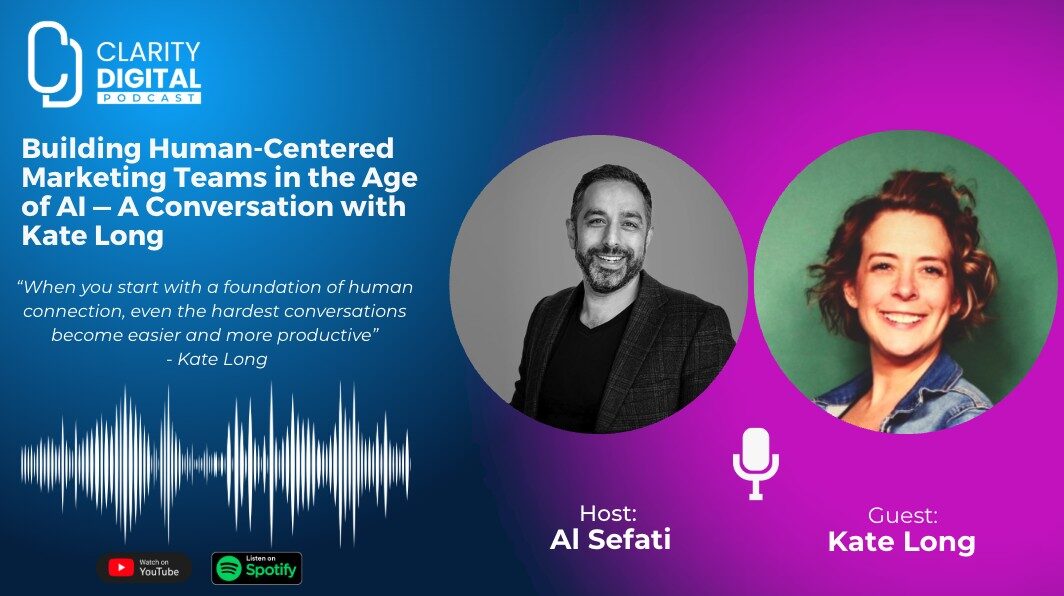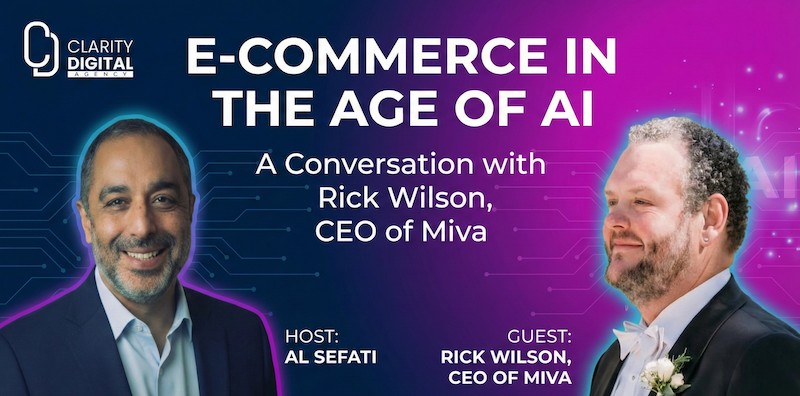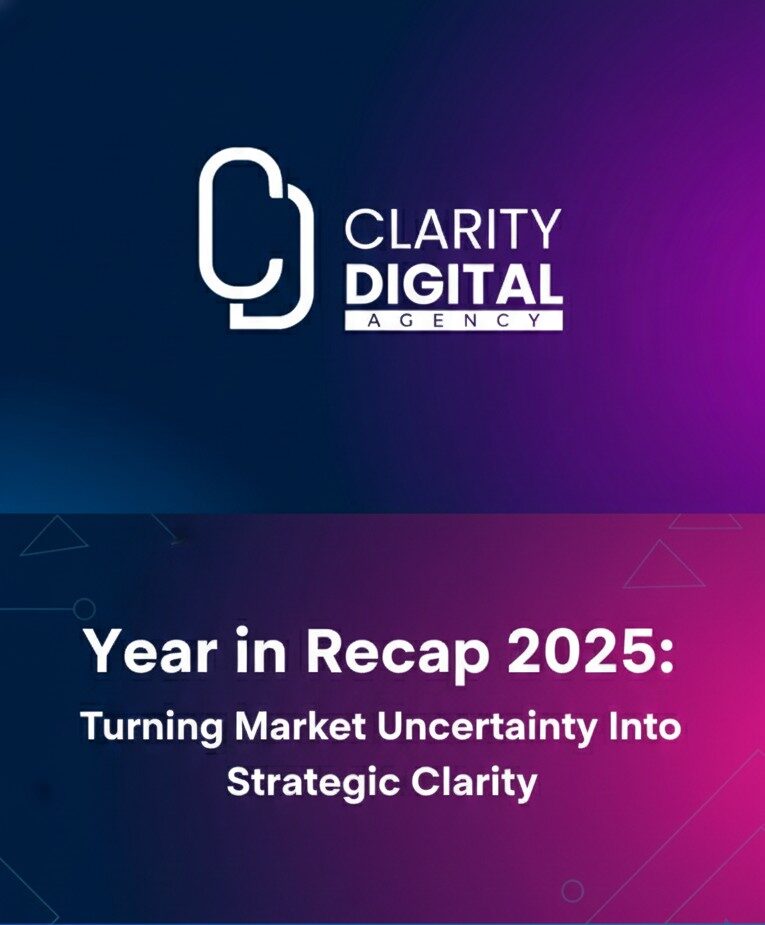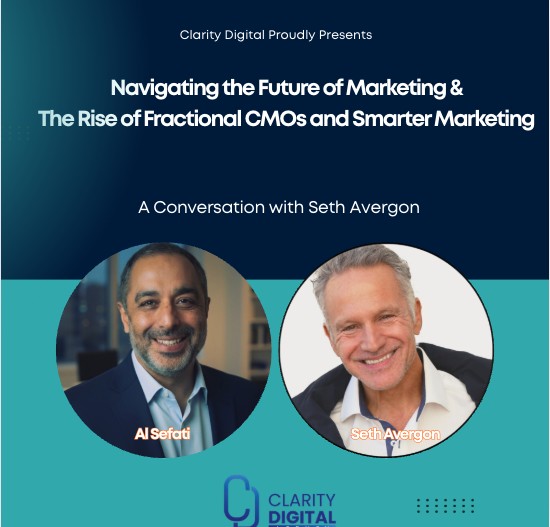On the latest episode of the Clarity Digital Pod, I sat down with Kate Long, VP of Marketing at Crunchbase, to dive deep into what it means to lead in today’s ever-evolving marketing landscape. From human-centered leadership to A.I. , this conversation had it all. If you’re in marketing leadership or navigating this new era of digital change, this episode is a must-listen.
From Corporate Roots to Startup Momentum
Kate’s marketing journey has been anything but linear. She’s held leadership roles at giants like Microsoft and Expedia, while also making transformative moves at high-growth companies like PitchBook and now Crunchbase. What’s the common thread? She thrives at inflection points—moments when companies need a catalyst for change.
Now at Crunchbase, Kate is leading the marketing team through a pivotal shift—from a self-serve, product-led growth model to an enterprise-focused, outbound sales engine powered by predictive data. The mission is clear: help customers not just access data, but predict the future of businesses using AI-backed insights.
The Power of Community in a Rapidly Changing Industry
One highlight of our talk was our shared appreciation for Coffee Talk—a Friday morning CMO meetup where leaders get real about what’s working, what’s failing, and how to move forward. Kate emphasized how the pace of change in marketing has never been faster. Playbooks from even a year ago are quickly becoming obsolete.
What sets leaders apart now is their willingness to share, collaborate, and build collective knowledge. And that’s exactly what Kate brings to the table—not just at Crunchbase but in the broader marketing community.
Leading with Humanity: Why Centered Leadership Matters
Kate’s take on leadership resonated deeply with me, especially as someone who has moved from corporate roles to running my own consulting agency. Her philosophy? People first—always.
Kate believes that everyone shows up to work with the intention of doing their best. It’s the leader’s job to create an environment where they can thrive. That starts with understanding each individual as a whole person—not just their skill set or function.
She shared how she fosters connection by learning what motivates her team members, understanding what’s happening in their lives, and building an authentic rapport. This human-centered approach doesn’t just build stronger teams—it also makes tough conversations and critical feedback more effective because they’re rooted in mutual respect and understanding.
Kate also pointed out the challenge leaders face in balancing empathy with accountability. “I have to be careful not to go too far into mama bear mode,” she said. It’s about recognizing both strengths and weaknesses while pushing everyone to reach a high standard.
Different Roles, Same High Bar: Measuring Impact with Nuance
One topic that sparked a great discussion was how to fairly evaluate different marketing functions. Whether someone’s working in technical SEO or crafting brand content, Kate emphasized that the bar for performance remains high—but the way success is communicated should vary based on role.
Creative roles might not always have a direct line to revenue, but that doesn’t mean they aren’t driving value. Kate advocates for looking beyond black-and-white metrics and instead appreciating nuance—like how content builds brand trust or how SEO supports long-term pipeline growth.
At Crunchbase, she’s even working to redefine how marketing performance is reported to leadership, shifting from weekly tactical reports to more strategic monthly updates that align sales and marketing under shared outcomes.
Crushing the TPS Report Mentality
As someone who’s been on the receiving end of rigid corporate reporting structures—complete with dreaded Monday morning SMART goals and TPS reports—I shared how demoralizing it can be to prioritize quantifiable tasks over meaningful ones.
Kate couldn’t agree more. She stressed that marketing metrics should be for marketing teams. It’s leadership’s job to insulate their teams from unnecessary noise and instead focus on what actually moves the business forward.
“You don’t need to explain every single SEO metric to your CEO,” she said. “What matters is the bigger picture—how SEO and everything else fits into the revenue engine.”
Crunchbase’s Big Pivot: From Historical Data to Predictive Intelligence
A big part of our discussion focused on the exciting AI-driven transformation underway at Crunchbase. The company has shifted its focus from simply offering historical business data to delivering real-time predictive insights using proprietary platform signals and machine learning.
Kate explained that the team realized several years ago that the value of raw historical data would decline as AI models began to ingest and generalize it. Instead of resisting the change, Crunchbase leaned into it. They built a unique dataset from over 17 years of user interactions on their platform and combined it with public signals like press releases and funding news.
The result? Predictive models that can anticipate events like layoffs, IPOs, growth spurts, and acquisitions before they happen. These insights aren’t just displayed in dashboards—they’re now embedded into sales workflows, marketing campaigns, and CRM tools like Salesforce, helping go-to-market teams focus their energy on the right targets at the right time.
And Kate’s not just marketing the solution—she’s using it herself. Her goal is to build a best-in-class go-to-market engine using Crunchbase’s own predictive data as the foundation.
AI as a Force Multiplier, Not a Job Killer
There’s a lot of fear out there around AI replacing jobs. But Kate takes a pragmatic and optimistic view. She sees AI as a force multiplier—a tool that enables marketers to do more of the strategic, high-impact work that actually drives results.
Whether it’s streamlining content creation, optimizing Google Ads, or analyzing campaign performance faster, AI is freeing up time and headspace for marketers to think bigger and connect more deeply with customers.
And yes, change is hard. It requires experimentation and failure. But that’s part of the journey. “I want my team to fall on their face,” Kate said. “Try it, tell me what didn’t work, share what you learned. That’s how we all grow.”
Embracing Uncertainty and Owning the Future
Kate and I also bonded over the fact that AI is ushering in a third major digital wave—first was the internet, then mobile, and now AI. And just like before, this wave is reshaping how marketers work, collaborate, and lead.
What sets leaders like Kate apart is the willingness to experiment, to admit they don’t know everything, and to stay grounded in human connection—even as technology accelerates everything around us.
She put it best: “At the end of the day, I just want to feel good about what I’m doing and who I’m doing it with. And I want my team to feel the same.”
Bonus Round: Getting to Know Kate
To wrap things up, I asked Kate a few quick questions to get a glimpse of the person behind the title:
What do you do when you’re not working?
Yoga, especially hot yoga. And you’ll probably find her at a baseball game—her three teenage boys all play. She also loves travel.
Favorite travel destinations?
Southern Chile (Punta Arenas and glaciers), Lake Michigan’s coast (no sharks, great dunes), and Barcelona (midnight beach walks and paella).
If you could be any superhero?
Flying is a must—so while Wonder Woman was an early childhood dream, Captain Marvel might win out for her flight skills.
Human-Centered Marketing Leadership in the AI Era
Kate Long is the kind of marketing leader who balances innovation with authenticity. Whether she’s guiding teams through AI transformation or helping reshape how data fuels go-to-market strategy, her approach is grounded in connection and impact.
Here are a few standout quotes from Kate during our conversation:
“Everyone comes to work to do their best. As a leader, it’s my job to create the kind of environment where they actually can.”
“When you start with a foundation of human connection, even the hardest conversations become easier and more productive.”
“AI isn’t replacing marketers. It’s helping us do the work that matters—the creative, strategic, big-picture stuff—better and faster.”
“If you’re not experimenting and falling on your face right now, you’re not learning fast enough.”
“Historical data alone wouldn’t be enough in the AI era”
As Crunchbase shifts from being just a source of historical data to a platform offering real-time predictive intelligence, Kate is at the forefront of this change. She’s not just marketing the future—she’s building it, testing it, and living it.
You can explore the new direction at Crunchbase, and follow Kate’s leadership journey on LinkedIn: Kate Long | “Kate the Marketer”





